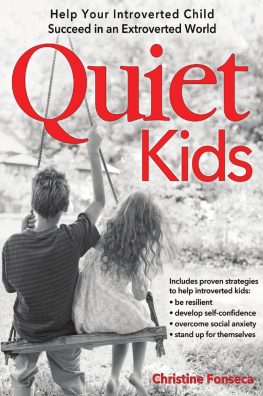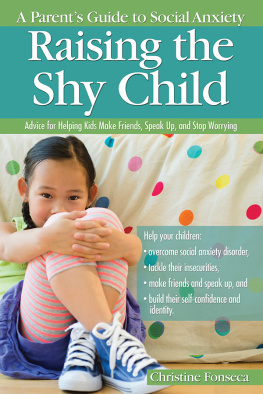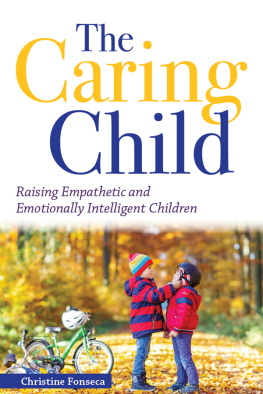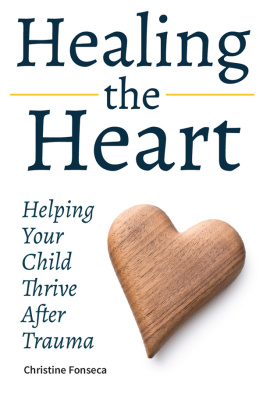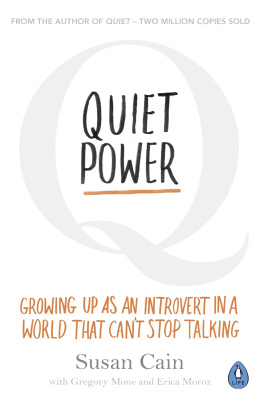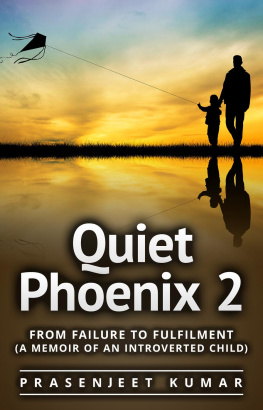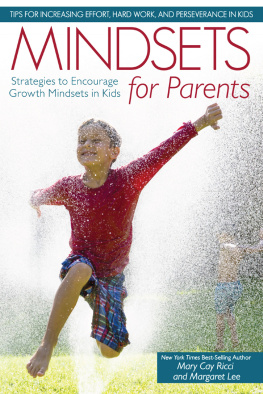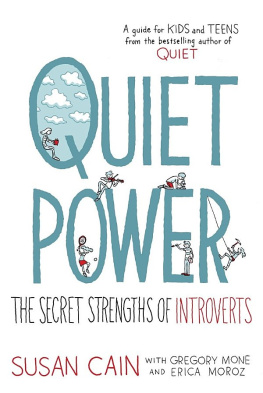About the Author
Critically acclaimed nonfiction and YA author Christine Fonseca believes that writing is a great way to explore humanity. Using her training and expertise as an educational psychologist, Ms. Fonseca is dedicated to helping children of all ages find their voice in the world. Her titles include Emotional Intensity in Gifted Students, 101 Success Secrets for Gifted Kids, and the recently released The Girl Guide.
In addition to her nonfiction titles, Ms. Fonseca is the author of several young adult novels including the psychological thriller, Transcend, and the Gothic romance, the Requiem series, featuring Lacrimosa, Libera Me, and Dominus. She has also penned several short stories including Dies Irae and Enigma.
When shes not writing or spending time with her family, she can be found sipping too many skinny vanilla lattes at her favorite coffee house or playing around on Facebook and Twitter. For more information about Christine Fonseca or her books, visit her website: http://christinefonseca.com .
Acknowledgements
I am an introverted adult, and, as such, I have had to learn how to harness the strength within my need for silence. I couldnt have learned how to draw on my own unique strengths without the team of people that regularly draw me from my shell and encourage me to share my knowledge with the world. And while I am certain this list is incomplete, here are a few of the people who have shaped this book and helped to make it more than I thought possible.
I couldnt have developed the ideas and this book without the encouragement and guidance of my editor, Lacy Compton. She is a constant support to me, shaping and guiding each and every title she convinces me to write. The teams at Prufrock Press and Sourcebooks continue her support and turn my ideas into something amazing.
My writing partner, Michelle McLean, an introvert herself, is always willing to tell it like it is and force me to go deeper in my work. Thank you for last-minute reading and lending your stories and support.
My writing buddies, Elana Johnson, Ali Cross, and Dustin Hansenwithout all of you I would have avoided this book altogether. Thank you for never letting me off the hook and forcing me to sit in the chair and pound this out! Your tweets got me through it all!
To my RL BFFs and cheer squad: Jodi, Stephanie, Jill, Judy, Corrine, Shauna, and AndreaYou all listen when I need to share, give me the quiet I need to renew, and understand the me inside. Your friendship means more than I could ever express. No matter how our lives change over the next few years, lets continue to commit to carve out time for each other!
The endless sea of support from the writing community, the bloggers, readers, and fangirls I never dreamed Id havealthough Ive never met the majority of you in person, you all mean the world to me. Your encouragement and understanding of the industry we all love is nothing short of amazing.
Finally, my acknowledgements are never complete without a personal thank you to my family, both immediate and extended. Dirck, Fabiana, and Erikayou three are the best cheerleaders and support team anyone could ever wish for. You work together to keep things running smoothly, no matter how stressed I get with my deadlines. Thank you seems too inadequate a word to capture the depth of my gratitude. Debra, Daryn, Karol, Vince, Errol, Celiayou are all so supportive and get me and my crazy need to write. Dad, Trudy, and Virginiayou know and understand the deepest aspects of who I am, and you are always around with encouragement when I need it the most. Thank you to all of you for everything you mean in my life!
Christine Fonseca
Authors Note
I remember the day the ideas for Quiet Kids started to gel in my head. Temperament has long been a part of the content in my speaking and coaching work, and something that people resonate toward in their questions and e-mails. As an introverted adult, I understand the impact my own introversion has had in my life. I know, firsthand, the information I wish my parents knew; the information they would have liked to have taught me. I remember watching my mom struggle with her own misconceptions about her introverted nature. And I remember my confusion as I tried, unsuccessfully, to turn myself into a social butterfly in a way that contradicted my own hardwiring. It is with these memories and thoughts that this book was written, each page and chapter crafted to inform and inspire parents as they work to help their introverted children thrive in a world that cherishes extroversion and often mislabels the introvert.
This book is filled with personal stories from my own life, as well as from the lives of people who have shared a snippet of their worlds with me during speaking engagements, coaching sessions, and through the focus groups I held as I researched the book. I have purposefully changed the names and identifying information in this book, as many of these individuals shared stories without realizing I would one day write a book on the topic. And although the stories are altered from their original form somewhat, they serve to illustrate the ups and downs of introverted children, and the challenges many parents and educators face when working with them.
My hope is that Quiet Kids will illuminate the strengths that exist within the introverted temperament and enable you to teach your children how to embrace their own silence and nurture this aspect of themselves.
Christine Fonseca
chapter
Leveling the Playing Field
Teachers and coaches dont get itthey expect everyone to be outgoing and aggressive. And when you arent, they assume you dont care. Its so wrong.Bishar, Age 16
The opening quote for this chapter highlights one of the biggest issues introverted children face in our Western culturethe belief that everyone should be outgoing and aggressive in order to get ahead; that somehow success cannot happen without those essential characteristics. As I highlighted in the previous , introverts are not the social or aggressive members of the group. This does not mean they are not motivated. They simply show their commitment in other ways. Hard work and dedication, taking time to help others, intensely listening to coaching, and building connections with a few team membersthis is how the introvert demonstrates his commitment to his interests.
In this chapter, I want to focus on the competitive aspects of our culture, building on the interventions in the previous . Children are faced with a higher level of competition than ever before. They are enrolled in more and more extracurricular activities in the name of enrichment. Their academic expectations are rising as well, with an emphasis on high-stakes testing and college preparation. Schools have cut creative arts programs, as well as creative thinking venues. Everything has become goal oriented with reduced emphasis on process. Group collaboration has replaced innovative thinking in education.
Dont get me wrong. The shift in education has developed from a need to improve student achievement and help make our children competitive in a global workforce. But at what price? There are limited opportunities for the introvert to shine in this type of venue.
As Ive stated previously, introverts do best when they understand the why behind the assignment. They like to experience information in depth and therefore hate to be rushed through tasks. They are innovative and independent in their work efforts. These are skills to be harnessed and developed.
So how can parents help bridge the gap between the current type of expectations placed on introverted thinkers and their natural style of learning? How does the playing field get leveled?
Parents can start by helping their children know what the expectations really are in school. Sit down with them and explain temperamenttheirs and the others they may encounter in the room. Help them to understand that neither is better or worse, just different. Once your child understands her temperament in relationship to the school expectations for performance, help your child develop social competency in the areas of initiating conversations with adults and peers, public speaking, and self-advocacy. Taught early and practiced often, these skills, and those on page 109, can help your introverted child be competitive in any environment.
Next page
